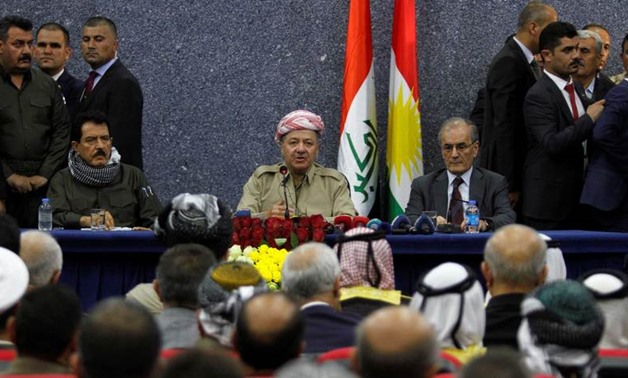
President of the Kurdistan Region of Iraq Massoud Barzani sits with Kirkuk Governor Najmaldin Karim (R) during his visit in Kirkuk, Iraq, Sept. 12, 2017. REUTERS.Ako Rasheed
CAIRO – 15 September 2017: The Kurdistan Parliament is set to reconvene on Friday evening, for the first time in almost two years. The Kurdish independence referendum is at the top of the agenda.
 General view of the Kurdistan Parliament meeting in Erbil, Iraq September 15, 2107. REUTERS/Azad Lashkari
General view of the Kurdistan Parliament meeting in Erbil, Iraq September 15, 2107. REUTERS/Azad Lashkari
Representatives of the United Nations, the United States, and the United Kingdom met with the Kurdish President Masoud Barzani on Thursday to suggest an alternative, postponing the upcoming independence referendum planned for September 25.
“The visiting delegation presented an alternative in place of holding the referendum on September 25. President Barzani received the alternative and welcomed constructive dialogue,” the statement read.
The decision to hold the referendum is not a unilateral, personal decision of Barzani, and all parties in the Kurdistan region have to discuss and study this offer.
“We will discuss the subject [the alternative] with the Kurdish political leadership and announce our response in this regard in near future,” the Kurdistan Region Presidency (KRP) cited Masoud Barzani as saying.
 Iraqi Kurdish President Masoud Barzani attends a rally in support for the upcoming September 25th independence referendum in Zakho, Iraq September 14, 2017. REUTERS/Ari Jalal
Iraqi Kurdish President Masoud Barzani attends a rally in support for the upcoming September 25th independence referendum in Zakho, Iraq September 14, 2017. REUTERS/Ari Jalal
However, hopes that the alternative deal will be accepted are not high.
Although the U.S. position has been firmly against the independence referendum, it is clear there is some miscommunication.
The U.S. State Department spokeswoman, Heather Nauert, said on Thursday that she is not aware of an alternative presented by the U.S., the U.K. and the U.N., in place of the planned independence referendum.
In other developments, the Kirkuk governor Najmaldin Karim said
, despite Thursday’s vote in the Iraqi Parliament to remove him.
A 2008 Iraqi law clearly states that “the Prime Minister of Iraq has the authority to remove any governors in Iraq," said Karim during an interview with Kurdistan 24. However, this comes with the exception of Kirkuk, "due to the province's special status."
 Governor of Kirkuk Province Najmaddin Kareem speaks during an interview with Reuters in Kirkuk, Iraq, September 14, 2017. REUTERS/Ako Rasheed
Governor of Kirkuk Province Najmaddin Kareem speaks during an interview with Reuters in Kirkuk, Iraq, September 14, 2017. REUTERS/Ako Rasheed
Tensions are running high after the local government in oil-rich Kirkuk voted to join the Kurdish independence referendum.
In contrast to other provinces, the current laws that apply to Kirkuk do not allow for the Iraqi Parliament, or the Iraqi Prime Minister, to remove the Governor of Kirkuk. This power lies with the Provincial Council.
“He is an elected governor of the council of Kirkuk,” Hoshyar Zebari, a senior Kurdish official told Reuters on Thursday. “That is the only body that can remove him.”
In other news:
After the meeting with international delegates, thousands of people gathered in the city of Zakho, in the northwest of the Kurdistan Region, in support of the independence referendum where Barzani insisted that the vote will take place on schedule.
“[The] referendum is a tool, not an objective. The objective is independence. The objective is for us to determine our fate,” Barzani told the 20,000 plus crowd. “We told them, before now and today, if there is a better alternative, our people would also agree. But if there is no alternative, we will go ahead with our referendum and let come what may.”
, an influential Shiite leader and the secretary general of the Badr Organization, said if the independence referendum is held, it could ignite war.
“We have to all ramp up our efforts to prevent the referendum and independence from happening,” said Amiri speaking in Najaf. “Unfortunately, when the civil war breaks out, blood will be shed.”




Comments
Leave a Comment